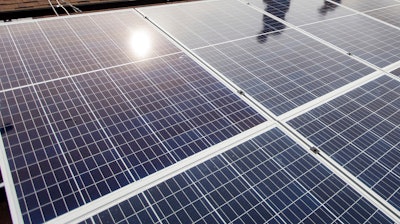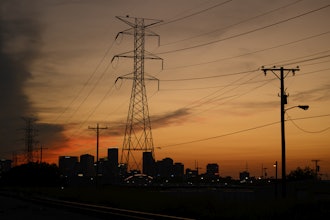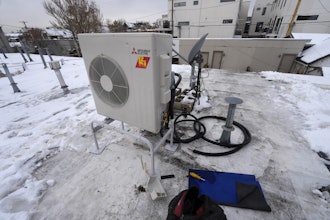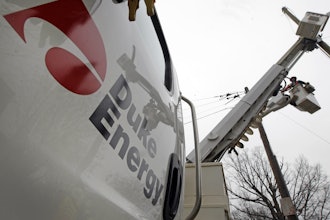
CHARLESTON, W.Va. (AP) — An entire county school system in coal-producing West Virginia is going solar, representing what a developer and U.S. Sen. Joe Manchin's office touted on Wednesday as the biggest-ever single demonstration of sun-powered renewable electricity in Appalachian public schools.
The agreement between Wayne County Schools and West Virginian solar installer and developer Solar Holler builds on historic investments in coal communities made possible by the Inflation Reduction Act, which Democratic Sen. Manchin had a major role in shaping as chairman of the Senate Energy and Natural Resources Committee.
Manchin, who announced this month that he wouldn't run for reelection in the deep-red state, citing an increasingly polarized political system, was quick Wednesday to tout U.S. President Joe Biden's 2022 landmark climate, health and tax law, which placed special emphasis on creating new clean energy jobs.
"Let's be clear — this investment in Wayne County is a direct result of the Inflation Reduction Act," he said in a written statement. "This type of investment in rural America to create jobs, make our country more energy secure and lower electric costs is exactly what the IRA was designed to do."
Through changes to tax code, the legislation included incentives for projects placed in coal communities including Wayne County; new financing options to increase investment in energy infrastructure; and funding to boost domestic manufacturing of energy technologies.
The solar installation is the latest school-related green energy project to come to the state with the help of a Biden administration-era spending package. Next month, Canadian-based electric bus manufacturer GreenPower Motor Co. Inc. — which recently opened a manufacturing facility in West Virginia's capital — is scheduled to deliver the state's first electric school buses to four county school districts.
Under Biden's $1 trillion infrastructure plan, school districts are eligible for rebates with the purchase of electric buses to replace diesel-powered vehicles.
Wayne County's project represents the largest power purchase agreement ever signed in West Virginia, and is expected to save the school system $6.5 million over the course of the 25-year agreement, according to the developer. In 2021, the GOP-dominated state Legislature passed a law facilitating solar deployment in the historically fossil fuel-dependent state. The law legalized power purchase agreements, which allows entities such as the Wayne County Schools to purchase energy generated by Solar Holler-owned systems without upfront capital investment.
Wayne County Schools Superintendent Todd Alexander said the anticipated financial impact of the project, set to be completed in 2025, is enough to fund the salaries of three additional teachers for the duration of their careers.
"Transitioning to solar power resonates beyond economics — it's a commitment to nurturing our students and community," he said in a statement.
The schools are currently powered by American Electric Power, one of the nation's largest electricity generators. As of 2022, the company depended on coal for 41% of its power generation, compared with 23% for hydroelectricity, wind, solar and pumped storage. In 2005, the company utilized coal for 70% of its power generation, and renewables for 4%.
Dan Conant, Solar Holler Founder and CEO, said some of his staff graduated from Wayne County Schools or have kids who are students there now. He said the project is an example of the state maintaining its legacy of energy production while transitioning to a cleaner model.
"It's the heart of coal country, where our state's proud history of energy production is rooted," he said. "It's literally the community that's helped build our business, so we're really grateful for the opportunity to shine a light on what solar can do for public institutions and education systems right here in Southern West Virginia."
All together, up to 10,000 solar panels are expected to deliver as much as 5.33 Megawatts of power to Wayne County Schools each year. Solar Holler estimates the first schools to be solarized in early 2024 and the others to go online on a rolling basis in the following 12 to 18 months.





















